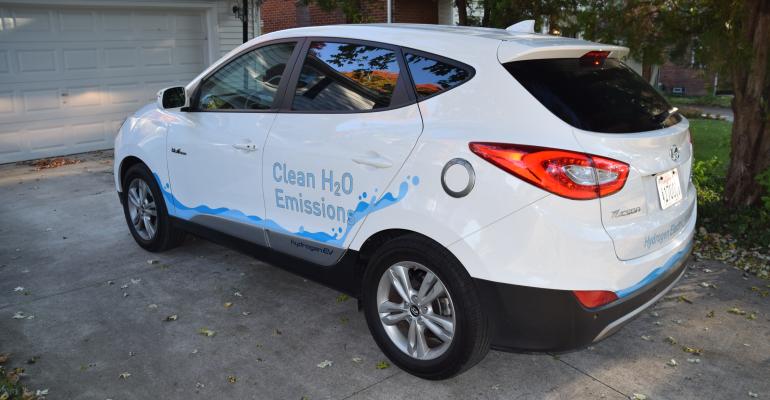Hyundai delivers 15 Tucson ix fuel-cell electric vehicles J’Car, a startup company in the Southern Korea city of Gwangju, for use in its car-sharing business.
The launch ceremony for the service took place last week with Hyundai Vice President Park Gwang-sik, Korea Environment Minister Cho Kyeung-kyu and Gwangju Mayor Yoon Jang-hyun among those participating.
In addition to the 15 FCEVs, Hyundai also is supplying J’Car with a mixed fleet of 27 battery-powered Ioniq and Kia Soul battery-electric vehicles.
It is the first time the Tucson ix (called the Hyundai Fuel Cell in the U.S.) has been placed into service on a car-sharing basis, a Hyundai official notes.
The FCEVs and EVs will be available for short-term rentals for about $5 an hour. The vehicles must be picked up and returned the same day.
The Ministry of Environment and the Gwangju Metropolitan City each provided subsidies for purchasing the FCEVs and jointly covered additional expenses involved in the transaction. Hyundai and its Kia affiliate will provide aftersales service for the fleet of eco-friendly vehicles.
“We are pleased that Hyundai Motor Group’s eco-friendly cars and the car-sharing business will bring synergy together,” Hyundai says in a statement. “Hyundai Motor Group will continue to accelerate the country’s commercialization drive of eco-friendly vehicles.”
Environment Minister Cho adds: “Hydrogen-fuel-cell vehicles usually cost more, making it more difficult for people to experience them. We believe this car-sharing service will give people a chance to ride in a fuel-cell vehicle and become motivated to buy one.”
Hyundai’s intent to provide the vehicles for the J’Car car sharing operation was first reported by WardsAuto in September.
At the time Hyundai announced an agreement with the Korean government to provide a total of 35 Tucson ix FCEVs to be placed in service as taxis or car-sharing vehicles. Of those, 10 began service last year as taxis in Ulsan, where Hyundai’s main vehicle production plants are located. Another five units are to begin taxi service in Ulsan this year, with five more slated for taxi service in Gwangju.
Additionally, Hyundai in September signed an agreement with the Australia Capital Region government to provide 20 of its next-generation FCEVs to Australia in 2018.
Hyundai plans to launch its next-generation FCEV in early 2018 so it will be available for promotional use at the 2018 Winter Olympics, to be held beginning in February in the Northern Korea city of Pyeongchang.
In January, Hyundai joined the Hydrogen Council, a group in which it plays a leading role in promoting the use of FCEVs. Other members include BMW Group, Daimler, Honda, Kawasaki, Toyota, Air Liquide and others.





